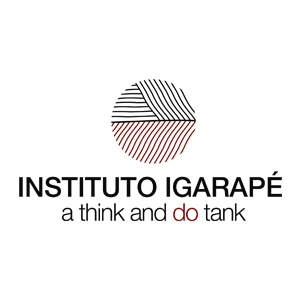For a Roadmap to Zero Deforestation – Official Statement
On this decisive day for COP30, the Igarapé Institute calls on countries to deliver a roadmap to end illegal deforestation. Confronting the ecosystem of environmental crime with the seriousness it requires is the starting point of this roadmap.
When forests are destroyed, carbon is no longer stored by these biomes and instead begins to be released, accelerating global warming. Climate change, in turn, intensifies extreme weather events, including droughts and fires that threaten forest resilience. It is a self-reinforcing cycle, one we urgently need to break.
The Igarapé Institute has worked tirelessly to include this issue in the COP30 Action Agenda and has developed a robust acceleration plan in partnership with government agencies, IBAMA, the Ministry of the Environment (MMA), the Federal Police, the Ministry of Foreign Affairs, and INPE, as well as other public institutions, civil society, and the private sector, to consolidate and scale Brazil’s successful deforestation-reduction experiences across the Amazon Basin and other tropical biomes around the world. In addition, the Institute helped ensure the issue gained prominence at the Leaders’ Summit: the document “Call to Action on Integrated Fire Management and Wildfire Resilience” reinforced the priority of tackling environmental crime.
These were important steps forward, but we still want to see the roadmap to zero deforestation bring this issue into the COP30 political decision-making process, with the creation of a work group capable of connecting the agendas of combating environmental crime and illicit financial flows, supply-chain traceability for forest-linked sectors, nature-finance instruments, and the strengthening of bioeconomies and high-integrity productive and ecological restoration sectors — which are essential climate solutions for carbon removal.
The Igarapé Institute is fully aligned with the statement released today by renowned scientists such as Carlos Nobre and Johan Rockström, within the framework of the Planetary Science Pavilion.
Our joint message is unequivocal: keeping the 1.5°C goal alive will only be possible with a realistic pathway to phase out fossil fuels and end deforestation. COP30 must take scientific evidence seriously.
“To rescue the mission of limiting global temperature rise to 1.5°C, a three-pillar strategy is necessary. This includes a roadmap for transitioning away from fossil fuels, a roadmap to achieve zero deforestation, and scaled-up carbon removal, especially through high-integrity nature-based solutions in forests and oceans.”
Ilona Szabó, Co-Founder and President of the Igarapé Institute
“We won’t hit the 1.5°C target unless we protect the world’s tropical forests, especially the Amazon Basin. With deforestation driving 10% of global emissions, forests must be worth more standing than cut down.”
Robert Muggah, Co-Founder and Chief Innovation Officer of the Igarapé Institute
“Confronting environmental crime is the starting point of the roadmap to zero deforestation, and Brazil has many lessons and solutions that can be shared with other tropical forest countries.”
Melina Risso, Research Director of the Igarapé Institute
Read the Mission 1.5 Technical Note
Read the Acceleration Plan to combat environmental crime and achieve zero deforestation



